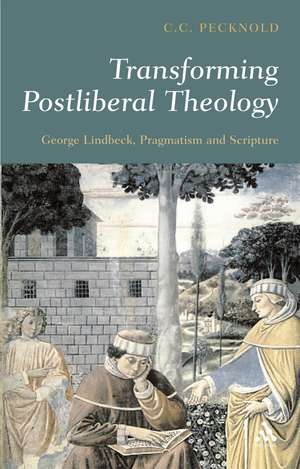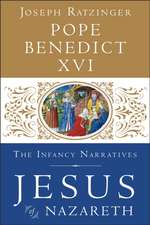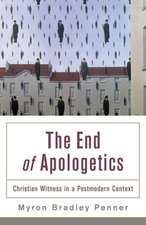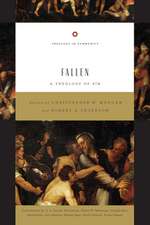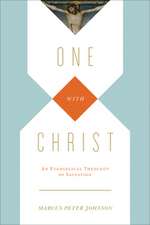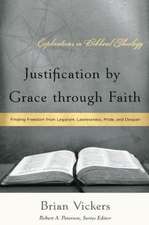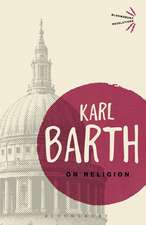Transforming Postliberal Theology: George Lindbeck, Pragmatism and Scripture
Autor C.C. Pecknolden Limba Engleză Paperback – 30 sep 2005
Preț: 221.91 lei
Preț vechi: 256.68 lei
-14% Nou
Puncte Express: 333
Preț estimativ în valută:
42.46€ • 44.34$ • 35.06£
42.46€ • 44.34$ • 35.06£
Carte tipărită la comandă
Livrare economică 15-29 aprilie
Preluare comenzi: 021 569.72.76
Specificații
ISBN-13: 9780567030344
ISBN-10: 0567030342
Pagini: 182
Dimensiuni: 138 x 216 x 12 mm
Greutate: 0.23 kg
Editura: Bloomsbury Publishing
Colecția T&T Clark
Locul publicării:London, United Kingdom
ISBN-10: 0567030342
Pagini: 182
Dimensiuni: 138 x 216 x 12 mm
Greutate: 0.23 kg
Editura: Bloomsbury Publishing
Colecția T&T Clark
Locul publicării:London, United Kingdom
Recenzii
'[A] compelling case for rethinking postliberalism in pragmatic terms.' Daniel Castelo, Seattle Pacific University, International Journal of Systemic Theology
"in this carefully argued book, Pecknold seeks to affirm what he takes as the core of Lindbeck's "postliberal" approach to theology-attentiveness to the way in which signs mediate our experience of reality-while suggesting that many of the criticisms levied against it (e.g., its alleged relativism and sectarianism) can be addressed by a systematic development of Lindbeck's real (if largely implicit) pragmatism, in which doctrines are tested against their ability to sustain the intelligibility of communal practices in novel contexts...On this largely Ochsian reading of postliberalism, scripture is not seen as a closed semiotic grind that "absorbs" the word without remainder, but rather as an open "scaffolding" in terms of which the community is called to test its understanding of God in conversation with Christian and non-Christian others." -Ian A. McFarland, Religious Studies Review, Vol. 33, No. 2, April 2007
'Postliberalism represents the leading edge of Christian theology today. George Lindbeck's is the most influential founding voice in postliberalism. And Chad Pecknold has composed the most important recent work on Lindbeck's postliberalism. Transforming Postliberal Theology makes two powerful philosophic claims: that Lindbeck's postliberalism finds its philosophic ally in Charles Peirce's pragmatism more than in Wittgenstein's theory of language games; and that both Lindbeck and Peirce find their theo-philosophical antecedent in Augustine's semiotics. On the strength of these claims, Pecknold devotes most of the book to redescribing Lindbeck's postliberalism as a species of "scriptural pragmatism," best understood in dialogue with both Christian and Jewish "theo-semiotics," from Augustine to Peirce to more recent rabbinic philosophies. Pecknold's remarkable work should be required reading for all who are influenced by or interested in the postliberal turn.' Peter Ochs, University of Virginia
'A fresh and persuasive approach to the controversies generated by "postliberal" theological projects. It suggests a more accurate reading of most "postliberal" proposals than their critics often provide, while taking critics' objections to them with utmost seriousness. In short, it makes an original and important contribution to current theology and deserves a wide hearing.' David H. Kelsey, Weigle Professor of Theology, Yale Divinity School, New Haven, CT, USA
'An important and fascinating issue for Christian theology is how postliberalism, which has been such a fruitful movement in the late twentieth century, is to develop in the twenty-first century. Pecknold offers a rich, perceptive discussion of George Lindbeck and the debates surrounding his thought, and then constructively goes beyond Lindbeck in dialogue with CS Peirce, recent Jewish thought, and above all Augustine of Hippo. The result is a strong, convincing proposal for a scriptural pragmatism that can engage deeply with scripture, tradition, the church, other scriptural faiths, and pressing public issues.' David F. Ford, University of Cambridge
'[A]n accessible yet thought-provoking introduction to current scholarly debates...Fluent and responsible work like this needs to be read and absorbed by as many practitioners as possible.'
"in this carefully argued book, Pecknold seeks to affirm what he takes as the core of Lindbeck's "postliberal" approach to theology-attentiveness to the way in which signs mediate our experience of reality-while suggesting that many of the criticisms levied against it (e.g., its alleged relativism and sectarianism) can be addressed by a systematic development of Lindbeck's real (if largely implicit) pragmatism, in which doctrines are tested against their ability to sustain the intelligibility of communal practices in novel contexts...On this largely Ochsian reading of postliberalism, scripture is not seen as a closed semiotic grind that "absorbs" the word without remainder, but rather as an open "scaffolding" in terms of which the community is called to test its understanding of God in conversation with Christian and non-Christian others." -Ian A. McFarland, Religious Studies Review, Vol. 33, No. 2, April 2007
'Postliberalism represents the leading edge of Christian theology today. George Lindbeck's is the most influential founding voice in postliberalism. And Chad Pecknold has composed the most important recent work on Lindbeck's postliberalism. Transforming Postliberal Theology makes two powerful philosophic claims: that Lindbeck's postliberalism finds its philosophic ally in Charles Peirce's pragmatism more than in Wittgenstein's theory of language games; and that both Lindbeck and Peirce find their theo-philosophical antecedent in Augustine's semiotics. On the strength of these claims, Pecknold devotes most of the book to redescribing Lindbeck's postliberalism as a species of "scriptural pragmatism," best understood in dialogue with both Christian and Jewish "theo-semiotics," from Augustine to Peirce to more recent rabbinic philosophies. Pecknold's remarkable work should be required reading for all who are influenced by or interested in the postliberal turn.' Peter Ochs, University of Virginia
'A fresh and persuasive approach to the controversies generated by "postliberal" theological projects. It suggests a more accurate reading of most "postliberal" proposals than their critics often provide, while taking critics' objections to them with utmost seriousness. In short, it makes an original and important contribution to current theology and deserves a wide hearing.' David H. Kelsey, Weigle Professor of Theology, Yale Divinity School, New Haven, CT, USA
'An important and fascinating issue for Christian theology is how postliberalism, which has been such a fruitful movement in the late twentieth century, is to develop in the twenty-first century. Pecknold offers a rich, perceptive discussion of George Lindbeck and the debates surrounding his thought, and then constructively goes beyond Lindbeck in dialogue with CS Peirce, recent Jewish thought, and above all Augustine of Hippo. The result is a strong, convincing proposal for a scriptural pragmatism that can engage deeply with scripture, tradition, the church, other scriptural faiths, and pressing public issues.' David F. Ford, University of Cambridge
'[A]n accessible yet thought-provoking introduction to current scholarly debates...Fluent and responsible work like this needs to be read and absorbed by as many practitioners as possible.'
